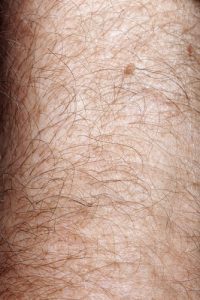In the News – Hairy Bodies Repel Bed Bugs
By Chris Williams on December 23, 2011.
If you have hairy arms and legs, lucky you! You may have a measure of protection from bed bugs.
In a research study, Professor Michael Siva-Jothy, from Sheffield University in England, found that hungry bed bugs placed on shaved arms were more likely to feed than bed bugs placed on unshaved arms. Why? Isn’t an arm an arm when you’re hungry for blood? Apparently not.
 Body hair works against bed bugs in two ways: the longer, visible hairs slow down bed bug movement as they have to wade through the “forest,” and finer “vellus” hairs near the surface warn the potential victim of the bed bug’s presence. Vellus hairs have nerves attached to them, allowing humans to feel the bed bug’s movement. Professor Mark Pagel at the University of Reading says, “This vellus hair is certainly no use for anything else, so it is a reasonable hypothesis that it developed in response to a strong selective pressure in our past” to avoid parasitic insects.
Body hair works against bed bugs in two ways: the longer, visible hairs slow down bed bug movement as they have to wade through the “forest,” and finer “vellus” hairs near the surface warn the potential victim of the bed bug’s presence. Vellus hairs have nerves attached to them, allowing humans to feel the bed bug’s movement. Professor Mark Pagel at the University of Reading says, “This vellus hair is certainly no use for anything else, so it is a reasonable hypothesis that it developed in response to a strong selective pressure in our past” to avoid parasitic insects.
If hairiness is good, you would expect then that men would be bitten by bed bugs less often than women, but that’s not the case. The researchers think this is because, as bed bugs have evolved along with their human prey, they have learned to head to the relatively hairless parts of the body such as the wrists and ankles. For men (and some women), being too hairy can actually be a detriment because a heavy coat of long thick hair also serves to hide bed bugs and other parasites. This may be the reason why humans have evolved to be less hairy than their ape cousins.
Biting pests have exerted a great deal of evolutionary pressure on humans. They remain a major cause of disease and death worldwide. Pagel says, “Mammals are unique in developing this wonderful fur, and humans are the only mammals to jettison it, so there must have been a very good reason to do so.” Man has become less hairy but has retained the vellus hairs that allow him to detect parasites. “If we lost all hair, even the relatively invisible fine hair,” says Siva-Jothy, “our detection ability goes right down.” Scientists have also suggested that swapping thicker fur for clothes evolved as a way to make insect bites and parasitic infestations less likely. (Source: BBC News, Dec. 14, 2011)